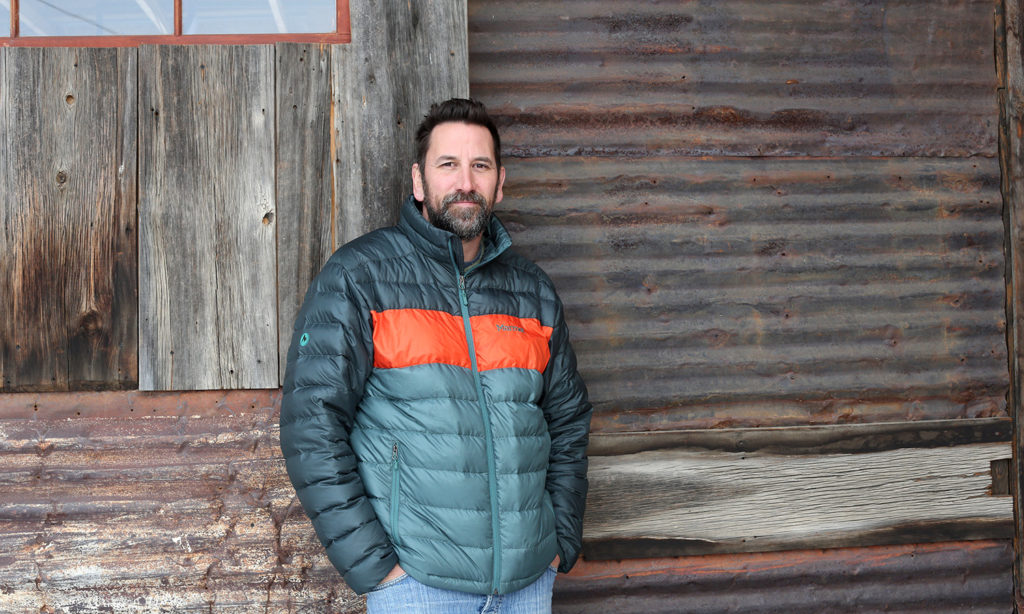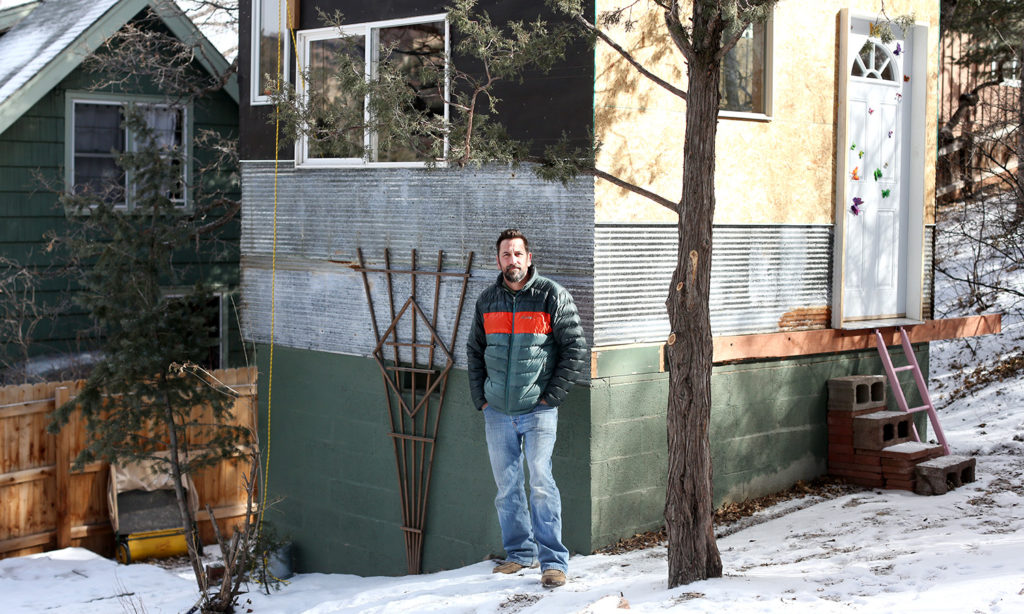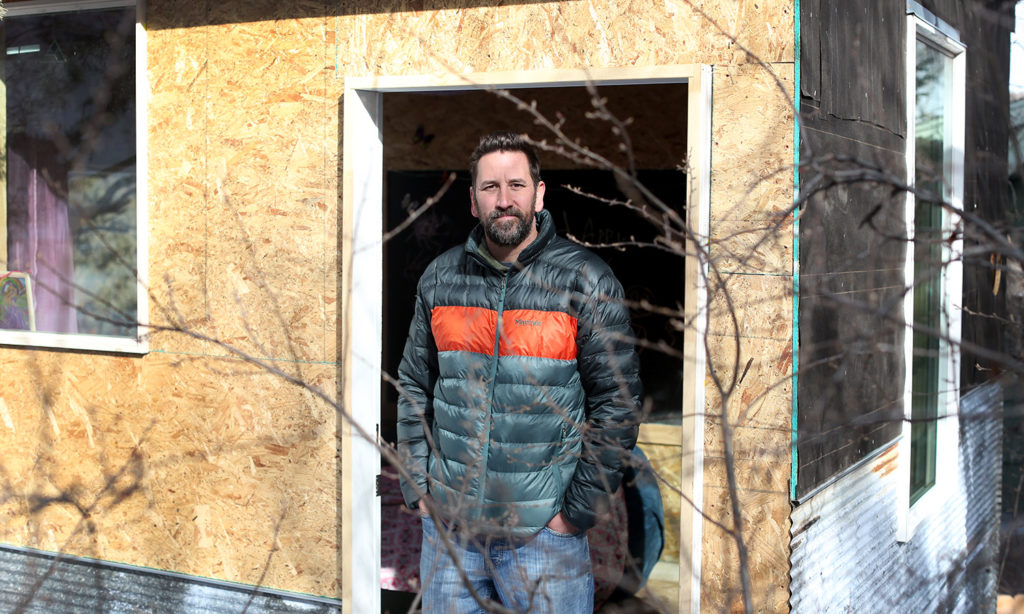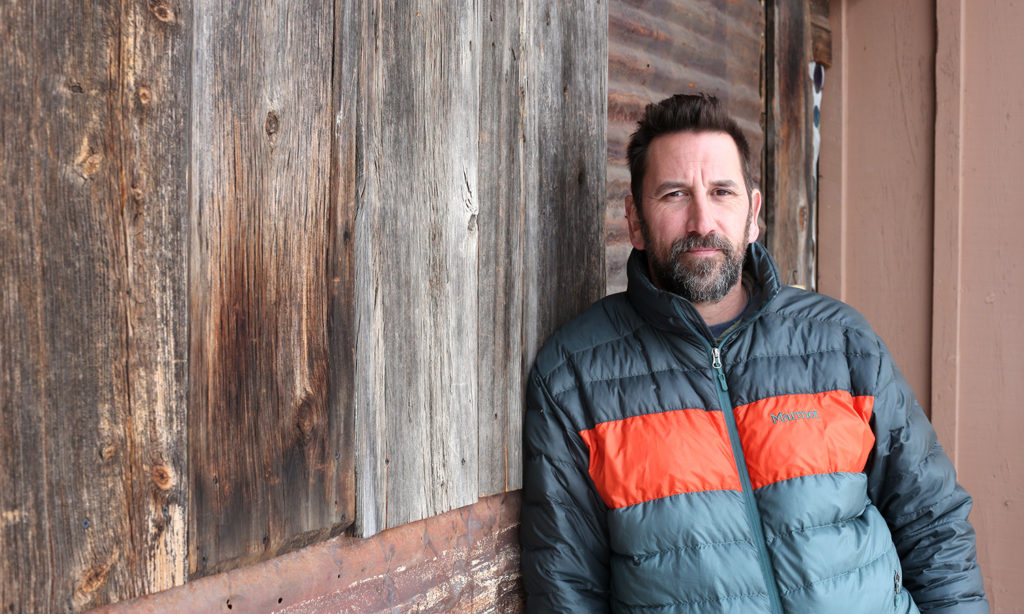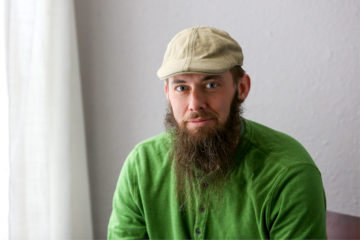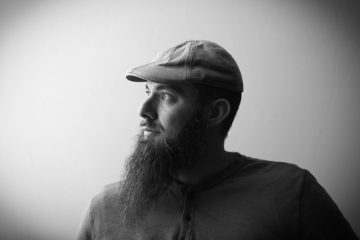It’s winter. Ben Engelhardt is home.
He spends warmer seasons traveling the U.S. as a wildland firefighter. Ben has more than 20 years’ experience working to control the chaos of wildfires. He carries a lengthy “red card,” the official list of his certifications. (Oddly, the red card is white.) When it’s wildfire season, he’s in demand. And Ben is not home.
On the morning we sat down in his kitchen to talk for Humanitou, Ben was glad to swap running a 20-firefighter crew in the wild for the chance to take his 3-year-old daughter to her first day of preschool.
Ben, 42, talks about how he went from high school dropout to gripping the reins of his destiny, with a little nudge from a master of motivation, Tony Robbins.
He shares how he used to spend winters roving the world, trying to shed the cash he’d piled up during fire season, and gaining an education on his terms.
We talk on matters of raising daughters in the current culture of masculinity, and why Ben is not likely to write that book of his adventures some wish he would.
Humanitou: What is it you love about being a wildland firefighter?
Ben: How dynamic it is, being able to think on your feet, the fact that, when you have a problem, you come up with a solution.
To work with other people who are motivated and positive, just active to the point they are willing to listen or give a hundred percent, and wake up on the ground, go have a cup of coffee, and they’re ready to go do it again for another day.
Not everybody can do that: sleep in the dirt, wake up and have a good attitude, work all day long, eat, crash, do it again. Most people aren’t programmed to do that.
Humanitou: It sounds like the military.
Ben: Oh, extremely. It has a lot of militaristic qualities to it. But the opposite of that is I get to go and explore these beautiful areas.
I ended up on an assignment in Steamboat for 17 days (last summer), doing an initial attack. We’re on, like, a hotel buffet tour. They’re hoteling us up every night. We’re getting to eat some of the best foods.
We bounced around from there to Craig, all around the surrounding areas. We end up doing an initial attack fire at around 11,000 feet. So, we hike from 8,000 feet to 11,000 feet.
Elk season was just starting, so you’ve got people out there elk hunting and you can hear elk out there bugling. And I’m in the wilderness in Colorado getting paid to hang out and hike 11,000-foot mountains with two other people.
Humanitou: Those parts sound amazing. It also sounds so different than what the general public probably is thinking about when wildfires are filling national news media.
Ben: Oh, yeah. The diversity of it is so extreme. Another one I went on, I left here, drove over to Utah and slept in the dirt everyday. I ate camp food every day. I didn’t hotel up and I didn’t get the awesome sushi and Kobe steak I got up in Steamboat. That’s the contrast.
Today I’m doing one thing. Tomorrow I’m doing something else. In a season, I could do five roles, each one of them might be with a different job title, in a different region in the United States. The diversity is vast.
People have that perception we’re in the smoke 24 hours a day, sleeping in the dirt, risking my life, running in and saving babies and cats, and not seeing my family for six months a year. And yeah, I did do that for years.
When I lived and worked out of Alaska for 15 years, I would give up everything. I would leave Michigan, where I was born and raised, and would fly up to Alaska in the spring. I’d work all season long in Alaska and when the season wrapped up, we’d gravitate to the Lower 48.
Then I’d take my money and run. I’d buy something big, a piece of property, a snow machine, a truck, something. Then I would travel internationally all winter long, just racking up stamps in passports, checking out different countries.
I did a lot of third-world traveling. I spent three winters in Southeast Asia, trying to learn Indonesia Bahasa and being a divemaster. Lived in Australia, New Zealand, Spain. I would bounce around, literally world travel, with the idea that was my education.
For over eight years, I hadn’t been in one spot for more than two months. That was work and travel, included. That kept me intrigued, fresh, new.
Humanitou: It sounds like a glamorous lifestyle, especially for a single guy in his 20s with cash in his pocket.
Ben: Yeah. I remember leaving the first time, driving out of Valdez having $10,000 for the first time at 20 or 21, and thinking, I have a one-way ticket to Asia and I’m going traveling all winter long, “This is going to be fuckin’ awesome.” And then coming home with money because I couldn’t spend it all.
Humanitou: It can be done pretty cheaply over there.
Ben: Yeah, I was living on a shoestring. I was backpacking it. A hostel was an upgrade from the dirt, you know?
When you’re used to sleeping in the dirt, I’m not needing the awesome, you know, five-star bathrooms. I’m not needing cable TV. All those are a luxury to me.
When I would travel home, I would hear these people complaining about this or that. It was like, “Wow, the things you guys are complaining about, they seem like first-world problems.”
Just having the opportunity to immerse yourself in it, or to teach English in Asia, or teaching kids how to bodysurf in Indo, you know? Just because you’re there and having a great time, with no worries.
It was lonely, in some regards, because I wasn’t with my family. I would try to reset each fall, touch base at home. Ice fish, bow hunt, kill a deer, whatever. And then buy a ticket, one-way, with the idea I wasn’t held by, “Oh, I have to be back here.”
I’d make a visa run and reset, but at my leisure. And I messed up sometimes. I’d count the days wrong and I’d have to pay my way out of a third-world country, or barter with them.
It was pretty intense, being taken off some buses at gunpoint where there was social unrest, especially in Asia. Indonesia and northern Sumatra was pretty rugged, pretty rough.
Then I learned a lot about Ramadan and fasting with the Muslims, and how that all played into their religion. It was really fascinating studying religion when I traveled, too, and realizing that Catholicism is what it is because of where we grew up. We had exposure to it.
Just like if we grew up in Thailand, we’d probably be Buddhist. Learning the differences and the nuances between them was just fascinating to me.
Humanitou: I’m convinced travel is one of the most valuable ways to gain education in the world. The lack of it feeds into a lot of issues we have culturally here, like with the current extremes of division and fear. How important was that travel to who you are as a person, as a parent, in any and all the ways you engage with life now?
Ben: I would say it astronomically shaped and molded me. I wasn’t a big academic kid. I’m a high school dropout. I dropped out of high school on, like, a Monday. By Thursday, I’d passed the GED. By the following Monday, I was enrolled in college.
Then I was like, “What the fuck am I doing here? Now I’m being yelled at and being told what to do while I’m paying for this. What is wrong with this?”
That’s why I quit college. Not because I’m a quitter, but because I didn’t want to be told what to do anymore. Then I was, like, “I’m going to Alaska.” That was it.
I went to Alaska and I commercial fished. I didn’t know anybody up there. I wanted to be in charge of my destiny.
I went to this thing. Tony Robbins. It was called ‘Unleash the Power Within.’ That was where I learned I’m in control of my destiny. … That whole three-day weekend that just rocked me to my core.
Yes, traveling helped shape and mold me. I’m sure you’ve heard it before: Everybody should live on their own to figure themselves out before they’re with someone else. I think that’s huge.
If I wouldn’t have done that, if I wouldn’t have traveled, if I wouldn’t have done the things that I was able to do because I had control of my destiny, I don’t think my marriage would last, I don’t think I would have kids.
I would still be either looking for something or would feel as though I would have regrets if I hadn’t world traveled, and gained that exposure and knowledge. I think not only all Americans, but everybody should have an opportunity to travel.
Humanitou: I’m guessing heading up to Alaska as the new kid on the fishing boat, and later with wildland firefighting, you had to hear a lot of barking about rules, though. What made that different, made that OK with you?
Ben: Yeah. The thing was I had work ethic. I had to differentiate between the two: somebody telling me what to do versus common sense and me knowing I had a responsibility and a job.
I had a paper route when I was younger. I worked on a potato farm in the summer. I had good work ethic. I just lacked the direction.
Growing up north of Detroit, we were into drugs. I needed to get out of Michigan. I knew that if I stayed in Michigan, I wasn’t going to be able to live or work at my capacity that I knew I could be bigger and better.
I just wanted to find what was going to make me happy, or find what interested me rather than being told what to do. Our job up to that point was school. I was over school. I never liked school. I wanted to see more. I wanted to be more.
I went to this thing. Tony Robbins. It was called “Unleash the Power Within.” That was where I learned I’m in control of my destiny. If I want it, I have to make sacrifices to get where I want to go. I have to commit. And you’re going to end up doing what you want to do.
We walked barefoot across fire that weekend. At that point, I was off and rolling. I never really looked back. I took the bull by the horns and decided to do what I wanted to do.
Humanitou: How old were you when you did that?
Ben: I was 17.
Humanitou: That’s an early age to come into contact with that experience, and to buy in and commit to it.
Ben: I got really lucky. A friend’s mom took me. I was kicked out of my house by then. My buddy’s mom, who I’d been staying with, took my buddy and I down to somewhere around Chicago. It was intense. And I saw changes in people.
There are so many things that stand out to me about that seminar but one of the things, especially, was Tony Robbins was standing up on stage and he says, “Who had a bad childhood? All right. Write it down.”
“OK. You were sexually molested. Your dad or mom beat you. Both your parents died when you were young.” You could list anything you wanted. He’s like, “All right, everybody rip it up. Get over it!”
He was like, are you going to continue to dwell on something that is out of your control, or are you going to do something with this and harness this power and energy, and do something that you want, and take control of your life?
It was little things like that over and over that whole three-day weekend that just rocked me to my core. That stands out to me, that particular event in my life.
Humanitou: What are your thoughts on the current cultural climate of masculinity? I ask that with these two thoughts in mind: you are raising two young daughters and you do a lot of things that can be seen traditionally as manly, rugged.
How do you view what’s happening in our culture, what’s being discussed as “toxic masculinity”?
Ben: It’s interesting. This season alone I took two different assignments with three women. Over my career I’ve never had a woman on any of my fire crews that I ran. Twenty-person crews. Yeah, there’s women in fire. That’s why they moved away from the term fireman. It’s firefighter now. I think it’s good.
My oldest daughter claims she wants to be a firefighter and go out on her first assignment with me. I love it. I’ve trained and taught plenty of women over the years. I feel as though they can do the same job as a male in the wildland arena or structure world. No difference. There shouldn’t be segregation or discrimination in regards to sex.
As far as the role that sexism is playing in society, at six and three, I don’t think (my daughters) are seeing that. Would I like to say that they can do everything a man can do? Sure.
And I think they should have every opportunity, just like they should get paid just as much as the guys they’re going to be working with when they get older. But for some reason in America, we don’t seem to think that is correct. I don’t think I’m treating them any differently than I would treat a boy.
When I had my first daughter, “You’d better have some guns.” Then the next guy would say, “That first one’s a real looker. I hope you’ve got some guns.”
Well, no. I’m going to teach them. They’re going to be smart, educated women and they’re going to make good decisions themselves, because of the people that they’ve become, because of my helping and shaping and molding, and because of their mom’s.
I’m not going to be the guy that meets the boyfriend at the door with a gun. That time has changed.
Humanitou: People could look at you as having a pretty big life — and in short time and counting.
Ben: I’ve had a lot of fun, a lot of that kind of feeling I had when I first started traveling. I realized that people were living their lives, in a way, through me and my pictures. “Hey, man, let us see your pictures.”
I stopped taking photos, especially of fire. It seemed like I already had that slide, or I wanted to focus on the moment and make sure I was doing the right things then, rather than trying to take a photo to capture what was going on.
But I’ve had a lot of people over the years say, “Why don’t you write a book? Why don’t you do this or do that?” I don’t really have a good answer other than I was living in the moment, I was seizing the day for what it was.
In a lot of ways, I’ve always felt like I’ve downplayed my job, because I feel like I’m bragging when I talk about it. Because it’s that cool and it’s that entertaining to me.
I’m not really going to tell my crazy “hair standing up on the back of my neck, I don’t really want to be here right now” stories. The “don’t want to fall asleep” things, I keep to myself. For me to spotlight me, I feel like I’m taking away from something else bigger.
